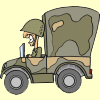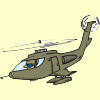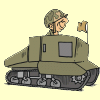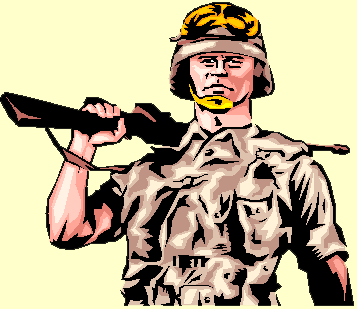|
Peace Keeping 101
 US Forces entering a country in a peacekeeping or peacemaking role, or as part of the end result of direct military action will restore order and discipline to the populace while reducing the threat of injury and death to our personnel. In that regard, the following peace keeping rules are in effect. These rules will be disseminated via leaflets and through available media sources. Lack of knowledge of these rules is no excuse for not being held accountable to them. US Forces entering a country in a peacekeeping or peacemaking role, or as part of the end result of direct military action will restore order and discipline to the populace while reducing the threat of injury and death to our personnel. In that regard, the following peace keeping rules are in effect. These rules will be disseminated via leaflets and through available media sources. Lack of knowledge of these rules is no excuse for not being held accountable to them.
- All locals will be considered belligerents first, and possibly terrorists; neutrals or loyal natives only if proven.
 Disarmament and the Right to Bear Arms. US Forces recognize the right of locals to bear arms for self-defense but must act first to protect themselves. Disarmament and the Right to Bear Arms. US Forces recognize the right of locals to bear arms for self-defense but must act first to protect themselves.
- Any local holding any weapon in his or her hands will be considered a belligerent or terrorist and will be shot.
- Any local owning a serviceable personal defense weapon such as an automatic rifle, a rifle, or a pistol and respective ammunition may exchange the weapon and ammunition for a .38 caliber pistol with holster and six rounds of ammunition. Exchange times and places will be announced in advance. Locals appearing to exchange weapons will have their weapon strapped over their back (in a holster in the case of a pistol) and will have their arms and hands showing and empty.
- After the exchange period, any local found with any weapon or ammunition other than a US-issued .38 will be considered a terrorist and will be dealt with accordingly. Locals not shot and killed for this violation will receive a lifetime Caribbean internment and will never see their homeland again. Illegal weapons found on the property of a local will be cause for all residents of that property to earn the same Caribbean internment. Interned relatives will be separated. All material and possessions on the property will be confiscated; any structures on the property will be demolished.
- National Registration. All locals will receive a national identification (ID) Card. Card issue times and places will be announced in advance.
- Locals will bring identification as specified in the announcement.
- ID cards will have a photo, fingerprint, voiceprint, and other appropriate information, such as the serial number of the .38 issued, if applicable. (All .38 pistols issued will be designed to have an accuracy not to exceed 30 feet and all issued pistols will be ballistic tested so any fired rounds may be traced back to the weapon.)
- At the time of registration, information will also be collected regarding each local’s employment (if employed) and job skills.
- After the registration period, any local without a national ID card will be considered a terrorist and will be dealt with accordingly.
 US Forces and local security forces under the control of US Forces may conduct random and routine ID card checks. US Forces and local security forces under the control of US Forces may conduct random and routine ID card checks.
- Security and Emergency Services
- A curfew will be in effect immediately. Local US Commanders will determine and disseminate curfew hours according to their assessment of the situation. Locals found violating the curfew will be dealt with as terrorists.
- Persons formally members of the local police, local medical services, and local military forces who identify themselves as such may be offered employment to serve US Forces and the new regime, when activated. Background checks will be conducted. These forces will be used for local policing, security, border patrol, and medical support operations. Local forces will have US Advisors assigned to the lowest possible operational level to assist with training and support.
- Mobile security screening facilities will be used. These facilities will be used for both routine screening of the populace and for interrogating individuals suspected of supporting terrorists. (These facilities will be large vans that will include – unknown to the populace – the latest in “sniffing” technology for gunpowder residue and explosives materials. Individuals failing a sniff test will be detained, perhaps interred.)
- Right to Assemble. Until US Forces determine that the local situation is secure and stable, the assembly of more than five people without a permit issued by US Forces is unauthorized. Violators will be arrested and subject to extensive detention.
- National Resources. All national assets and resources such as public buildings, public land, petroleum, minerals, and lumber become property of the US until final disposition is determined. These assets may be sold to defray occupation costs.
 Media. A US Forces newspaper, radio, and television will be made operational as soon as possible to provide entertainment and information. Other entities seeking to operate a newspaper, radio station or television station may apply to US Forces for a permit. Opinions expressed by local media need not reflect those of US Forces and its allies, but any use of the media to enflame locals or to be disruptive to reconstruction efforts is prohibited. Media. A US Forces newspaper, radio, and television will be made operational as soon as possible to provide entertainment and information. Other entities seeking to operate a newspaper, radio station or television station may apply to US Forces for a permit. Opinions expressed by local media need not reflect those of US Forces and its allies, but any use of the media to enflame locals or to be disruptive to reconstruction efforts is prohibited.
- Infrastructure.
- Schools, Hospitals, Libraries, Museums and Other Public Service activities will be made operational as a first priority. The use of local labor - as opposed to the use of defense contractors - is the preferred method of getting work accomplished.
- Roads, bridges, water and electrical supply, waste removal and sanitation, and critical industries such as petroleum distribution, steel fabrication, cement and concrete plants, and quarries will be restored to operational status as soon as possible using local labor and local contracts to the maximum extent possible. Profits from these operations will be used initially to assist in funding US Forces efforts.
- Religious and “protected” structures. In the event there are combat operations, US Forces will not intentionally destroy historic or religious places, but will not refrain from destroying such places if their use is a factor in endangering US Forces.
 As our history proves, the United States role in overseas military activities has been to protect the security of the country and to ultimately return power to a national government, as was done for Germany and Japan. This will continue to be the case; however the often-dangerous nature of the world mandates that during this transition our forces and their interests be protected. Locals who understand and abide by the above rules will soon find their country better off than ever before; those who break the rules will suffer the consequences. As our history proves, the United States role in overseas military activities has been to protect the security of the country and to ultimately return power to a national government, as was done for Germany and Japan. This will continue to be the case; however the often-dangerous nature of the world mandates that during this transition our forces and their interests be protected. Locals who understand and abide by the above rules will soon find their country better off than ever before; those who break the rules will suffer the consequences.
Back to Army Stuff.
|
 US Forces entering a country in a peacekeeping or peacemaking role, or as part of the end result of direct military action will restore order and discipline to the populace while reducing the threat of injury and death to our personnel. In that regard, the following peace keeping rules are in effect. These rules will be disseminated via leaflets and through available media sources. Lack of knowledge of these rules is no excuse for not being held accountable to them.
US Forces entering a country in a peacekeeping or peacemaking role, or as part of the end result of direct military action will restore order and discipline to the populace while reducing the threat of injury and death to our personnel. In that regard, the following peace keeping rules are in effect. These rules will be disseminated via leaflets and through available media sources. Lack of knowledge of these rules is no excuse for not being held accountable to them. Disarmament and the Right to Bear Arms. US Forces recognize the right of locals to bear arms for self-defense but must act first to protect themselves.
Disarmament and the Right to Bear Arms. US Forces recognize the right of locals to bear arms for self-defense but must act first to protect themselves. US Forces and local security forces under the control of US Forces may conduct random and routine ID card checks.
US Forces and local security forces under the control of US Forces may conduct random and routine ID card checks. Media. A US Forces newspaper, radio, and television will be made operational as soon as possible to provide entertainment and information. Other entities seeking to operate a newspaper, radio station or television station may apply to US Forces for a permit. Opinions expressed by local media need not reflect those of US Forces and its allies, but any use of the media to enflame locals or to be disruptive to reconstruction efforts is prohibited.
Media. A US Forces newspaper, radio, and television will be made operational as soon as possible to provide entertainment and information. Other entities seeking to operate a newspaper, radio station or television station may apply to US Forces for a permit. Opinions expressed by local media need not reflect those of US Forces and its allies, but any use of the media to enflame locals or to be disruptive to reconstruction efforts is prohibited.
 As our history proves, the United States role in overseas military activities has been to protect the security of the country and to ultimately return power to a national government, as was done for Germany and Japan. This will continue to be the case; however the often-dangerous nature of the world mandates that during this transition our forces and their interests be protected. Locals who understand and abide by the above rules will soon find their country better off than ever before; those who break the rules will suffer the consequences.
As our history proves, the United States role in overseas military activities has been to protect the security of the country and to ultimately return power to a national government, as was done for Germany and Japan. This will continue to be the case; however the often-dangerous nature of the world mandates that during this transition our forces and their interests be protected. Locals who understand and abide by the above rules will soon find their country better off than ever before; those who break the rules will suffer the consequences.